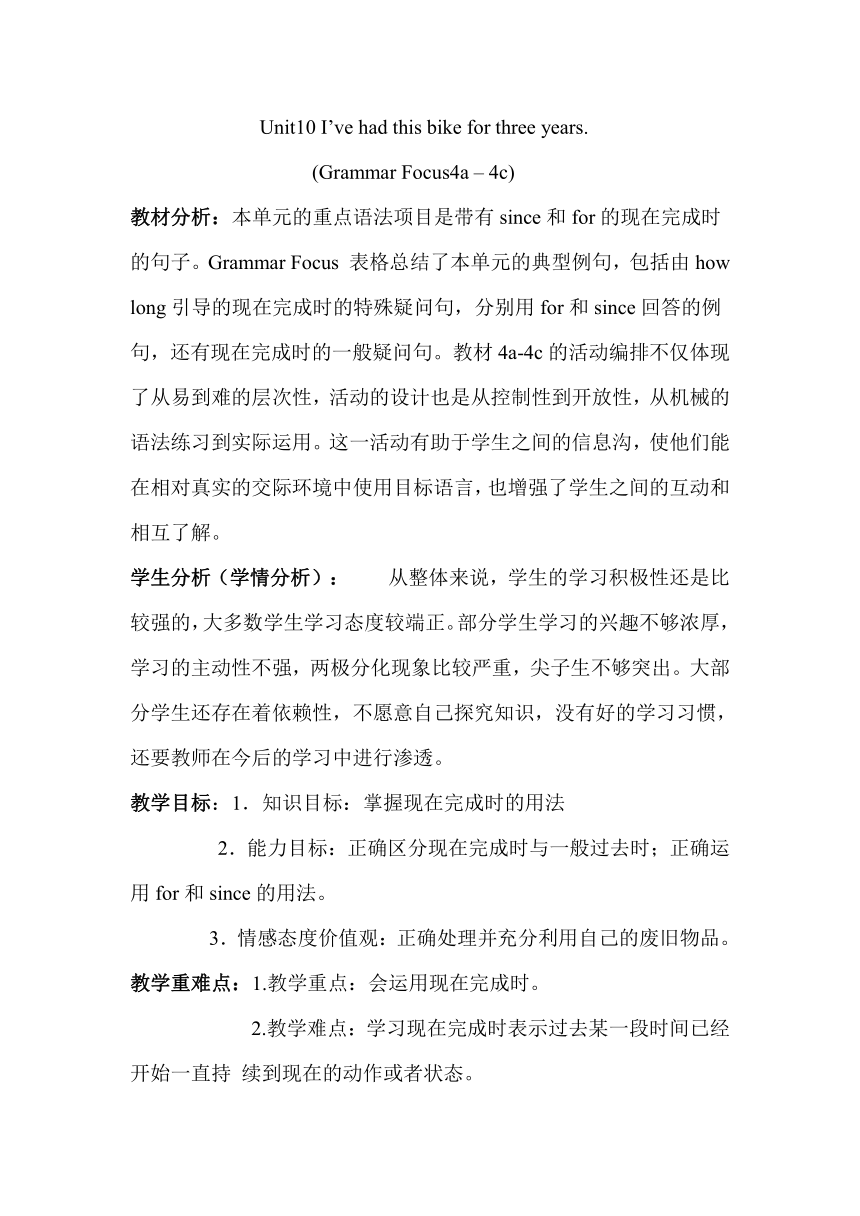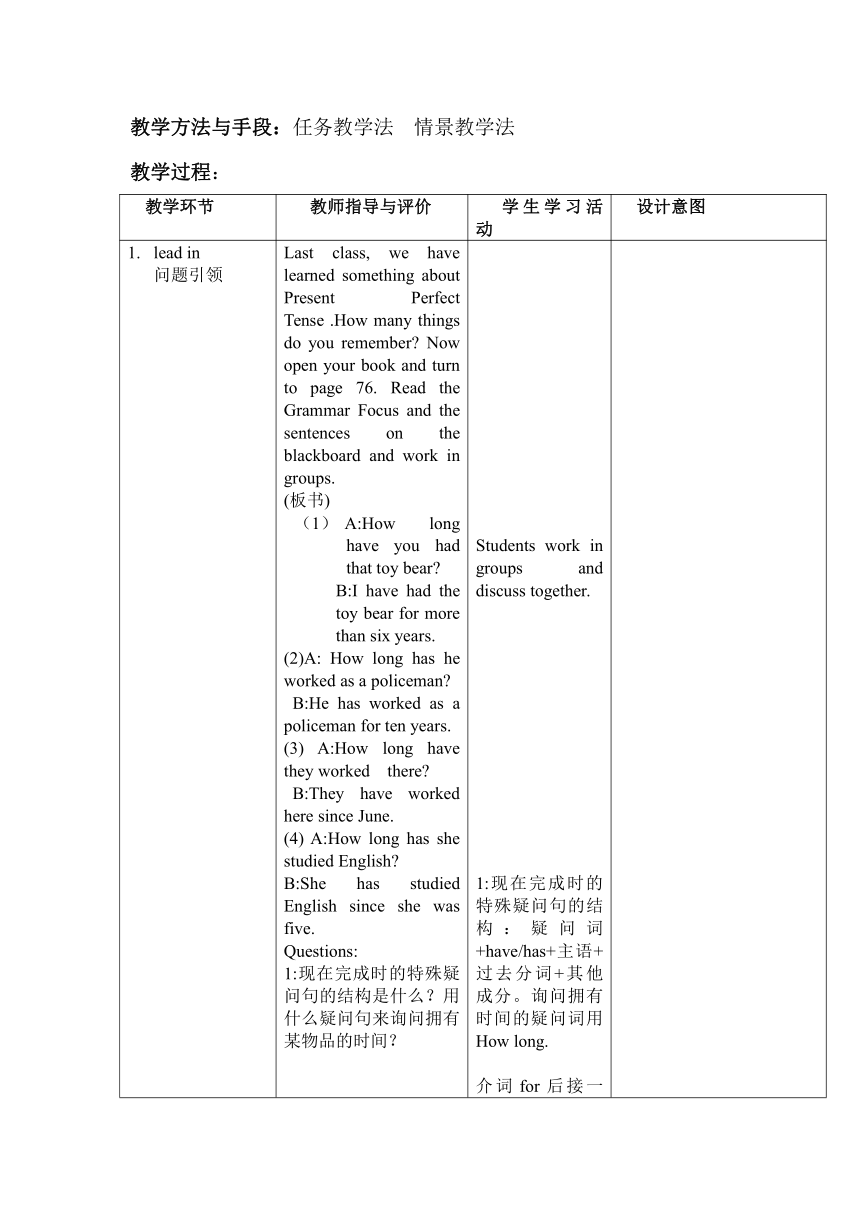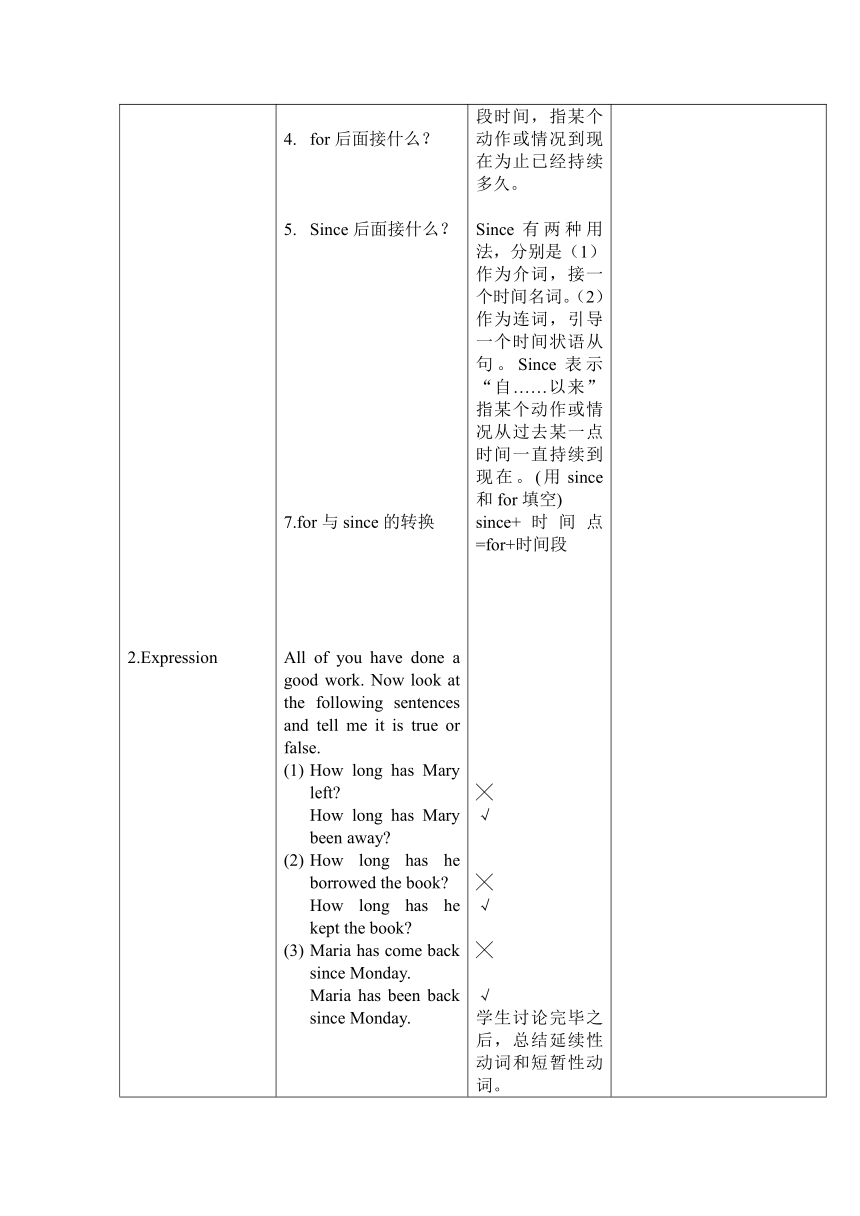人教版八年级下册 Unit 10 I've had this bike for three years. SectionA Grammar focus 4a-4c 教案(表格式)
文档属性
| 名称 | 人教版八年级下册 Unit 10 I've had this bike for three years. SectionA Grammar focus 4a-4c 教案(表格式) |  | |
| 格式 | doc | ||
| 文件大小 | 69.5KB | ||
| 资源类型 | 教案 | ||
| 版本资源 | 人教新目标(Go for it)版 | ||
| 科目 | 英语 | ||
| 更新时间 | 2022-12-23 19:22:30 | ||
图片预览



文档简介
Unit10 I’ve had this bike for three years.
(Grammar Focus4a – 4c)
教材分析:本单元的重点语法项目是带有since和for的现在完成时的句子。Grammar Focus 表格总结了本单元的典型例句,包括由how long引导的现在完成时的特殊疑问句,分别用for和since回答的例句,还有现在完成时的一般疑问句。教材4a-4c的活动编排不仅体现了从易到难的层次性,活动的设计也是从控制性到开放性,从机械的语法练习到实际运用。这一活动有助于学生之间的信息沟,使他们能在相对真实的交际环境中使用目标语言,也增强了学生之间的互动和相互了解。
学生分析(学情分析): 从整体来说,学生的学习积极性还是比较强的,大多数学生学习态度较端正。部分学生学习的兴趣不够浓厚,学习的主动性不强,两极分化现象比较严重,尖子生不够突出。大部分学生还存在着依赖性,不愿意自己探究知识,没有好的学习习惯,还要教师在今后的学习中进行渗透。
教学目标:1.知识目标:掌握现在完成时的用法
2.能力目标:正确区分现在完成时与一般过去时;正确运用for 和since的用法。
3.情感态度价值观:正确处理并充分利用自己的废旧物品。
教学重难点:1.教学重点:会运用现在完成时。
2.教学难点:学习现在完成时表示过去某一段时间已经开始一直持 续到现在的动作或者状态。
教学方法与手段:任务教学法 情景教学法
教学过程:
教学环节 教师指导与评价 学生学习活动 设计意图
lead in问题引领2.Expressioncomplete 4aStudy by Themselvescomplete plete 4c6.Exercise Last class, we have learned something about Present Perfect Tense .How many things do you remember Now open your book and turn to page 76. Read the Grammar Focus and the sentences on the blackboard and work in groups.(板书)A:How long have you had that toy bear B:I have had the toy bear for more than six years.(2)A: How long has he worked as a policeman B:He has worked as a policeman for ten years.(3) A:How long have they worked there B:They have worked here since June.(4) A:How long has she studied English B:She has studied English since she was five.Questions:1:现在完成时的特殊疑问句的结构是什么?用什么疑问句来询问拥有某物品的时间?for后面接什么?Since后面接什么?7.for与since的转换All of you have done a good work. Now look at the following sentences and tell me it is true or false.How long has Mary left How long has Mary been away How long has he borrowed the book How long has he kept the book Maria has come back since Monday.Maria has been back since Monday.教师总结buy –have hadleave—have been awayBorrow—have keptDie—have been deadBegin-have been onOpen-have been OpenRewrite the sentences using for or sinceJim is in Japan. He arrived there three years ago. They are very hungry. Their last meal was ten hours ago. I have a camera. I bought it in 2009. I know Ann. I first met her three years ago. Linda is ill. She became ill on Monday.Fill in the blanks with correct forms of the verbs in brackets. 1. I __________ (never be) to the water park before. I want to _____ (go) next month before the weather gets too cold. 2. They _____________ (never own) any pets, but they ___________ (always want) to have a dog. 3. We ________ (have) a piano since last November. We ______ (buy) it from the Li family when they moved to the US last year. 4. Cathy and Amy __________ (not be) back to their hometown for two years. They _______ (miss) their hometown a lot and hope to visit the place next year. 5. This museum __________ (be) here for over 20 years. It ______ (be) one of the oldest buildings in this small town.Group work: Fill in the blank and make your own conversation.ThingHow longTonyS1S2Do you miss your parents far away Yes, very much. They ________ the hometown since two years ago.. A. left B.have left C. were away from D.have been away from 2、Hurry up! The film __ for fifteen minutes.. A. begin B.has begun C. is beginning D. has been on 3、She ____________this book since she bought it from the bookstore. . A. has borrowed B.has lent C.has bought D. has kept 4、Mr Fan __________this watch in 2005. He ________ it for 8 years. . A. bought;has had B. bought; has C. has bought ;has had D. has bought; had 5、Some students in Shanghai ___________ e-bags for several months. A. have B.have had C.had D.will have Students work in groups and discuss together.1:现在完成时的特殊疑问句的结构:疑问词+have/has+主语+过去分词+其他成分。询问拥有时间的疑问词用How long.介词for后接一段时间,指某个动作或情况到现在为止已经持续多久。Since有两种用法,分别是(1)作为介词,接一个时间名词。(2)作为连词,引导一个时间状语从句。Since表示“自……以来”指某个动作或情况从过去某一点时间一直持续到现在。(用since和for填空)since+时间点=for+时间段╳√╳√╳√学生讨论完毕之后,总结延续性动词和短暂性动词。Jim has been in Japan for three years. They have been hungry for ten hours/since ten hours ago. I have had a camera since 2009. I have known Ann for three years/since three years ago. Linda has been ill since Monday.A:Do you own a basketball B;No,but I own a basketball.A:Hwo long have you owned it B:I have owned it for almost two years.
板书设计
Unit 10 I’ve had this bike for three years.(Grammar Focus 4a---4c)
(1)
(2) A:How long have you had that toy bear
B:I have had the toy bear for more than six years.
(3) A: How long has he worked as a policeman
B:He has worked as a policeman for ten years.
(3) A:How long have they worked there
B:They have worked here since June.
(4) A:How long has she studied English
B:She has studied English since she was five.
buy – have had
leave---have been away
borrow—have kept
die—have been dead
begin-have been on
open-have been open
(Grammar Focus4a – 4c)
教材分析:本单元的重点语法项目是带有since和for的现在完成时的句子。Grammar Focus 表格总结了本单元的典型例句,包括由how long引导的现在完成时的特殊疑问句,分别用for和since回答的例句,还有现在完成时的一般疑问句。教材4a-4c的活动编排不仅体现了从易到难的层次性,活动的设计也是从控制性到开放性,从机械的语法练习到实际运用。这一活动有助于学生之间的信息沟,使他们能在相对真实的交际环境中使用目标语言,也增强了学生之间的互动和相互了解。
学生分析(学情分析): 从整体来说,学生的学习积极性还是比较强的,大多数学生学习态度较端正。部分学生学习的兴趣不够浓厚,学习的主动性不强,两极分化现象比较严重,尖子生不够突出。大部分学生还存在着依赖性,不愿意自己探究知识,没有好的学习习惯,还要教师在今后的学习中进行渗透。
教学目标:1.知识目标:掌握现在完成时的用法
2.能力目标:正确区分现在完成时与一般过去时;正确运用for 和since的用法。
3.情感态度价值观:正确处理并充分利用自己的废旧物品。
教学重难点:1.教学重点:会运用现在完成时。
2.教学难点:学习现在完成时表示过去某一段时间已经开始一直持 续到现在的动作或者状态。
教学方法与手段:任务教学法 情景教学法
教学过程:
教学环节 教师指导与评价 学生学习活动 设计意图
lead in问题引领2.Expressioncomplete 4aStudy by Themselvescomplete plete 4c6.Exercise Last class, we have learned something about Present Perfect Tense .How many things do you remember Now open your book and turn to page 76. Read the Grammar Focus and the sentences on the blackboard and work in groups.(板书)A:How long have you had that toy bear B:I have had the toy bear for more than six years.(2)A: How long has he worked as a policeman B:He has worked as a policeman for ten years.(3) A:How long have they worked there B:They have worked here since June.(4) A:How long has she studied English B:She has studied English since she was five.Questions:1:现在完成时的特殊疑问句的结构是什么?用什么疑问句来询问拥有某物品的时间?for后面接什么?Since后面接什么?7.for与since的转换All of you have done a good work. Now look at the following sentences and tell me it is true or false.How long has Mary left How long has Mary been away How long has he borrowed the book How long has he kept the book Maria has come back since Monday.Maria has been back since Monday.教师总结buy –have hadleave—have been awayBorrow—have keptDie—have been deadBegin-have been onOpen-have been OpenRewrite the sentences using for or sinceJim is in Japan. He arrived there three years ago. They are very hungry. Their last meal was ten hours ago. I have a camera. I bought it in 2009. I know Ann. I first met her three years ago. Linda is ill. She became ill on Monday.Fill in the blanks with correct forms of the verbs in brackets. 1. I __________ (never be) to the water park before. I want to _____ (go) next month before the weather gets too cold. 2. They _____________ (never own) any pets, but they ___________ (always want) to have a dog. 3. We ________ (have) a piano since last November. We ______ (buy) it from the Li family when they moved to the US last year. 4. Cathy and Amy __________ (not be) back to their hometown for two years. They _______ (miss) their hometown a lot and hope to visit the place next year. 5. This museum __________ (be) here for over 20 years. It ______ (be) one of the oldest buildings in this small town.Group work: Fill in the blank and make your own conversation.ThingHow longTonyS1S2Do you miss your parents far away Yes, very much. They ________ the hometown since two years ago.. A. left B.have left C. were away from D.have been away from 2、Hurry up! The film __ for fifteen minutes.. A. begin B.has begun C. is beginning D. has been on 3、She ____________this book since she bought it from the bookstore. . A. has borrowed B.has lent C.has bought D. has kept 4、Mr Fan __________this watch in 2005. He ________ it for 8 years. . A. bought;has had B. bought; has C. has bought ;has had D. has bought; had 5、Some students in Shanghai ___________ e-bags for several months. A. have B.have had C.had D.will have Students work in groups and discuss together.1:现在完成时的特殊疑问句的结构:疑问词+have/has+主语+过去分词+其他成分。询问拥有时间的疑问词用How long.介词for后接一段时间,指某个动作或情况到现在为止已经持续多久。Since有两种用法,分别是(1)作为介词,接一个时间名词。(2)作为连词,引导一个时间状语从句。Since表示“自……以来”指某个动作或情况从过去某一点时间一直持续到现在。(用since和for填空)since+时间点=for+时间段╳√╳√╳√学生讨论完毕之后,总结延续性动词和短暂性动词。Jim has been in Japan for three years. They have been hungry for ten hours/since ten hours ago. I have had a camera since 2009. I have known Ann for three years/since three years ago. Linda has been ill since Monday.A:Do you own a basketball B;No,but I own a basketball.A:Hwo long have you owned it B:I have owned it for almost two years.
板书设计
Unit 10 I’ve had this bike for three years.(Grammar Focus 4a---4c)
(1)
(2) A:How long have you had that toy bear
B:I have had the toy bear for more than six years.
(3) A: How long has he worked as a policeman
B:He has worked as a policeman for ten years.
(3) A:How long have they worked there
B:They have worked here since June.
(4) A:How long has she studied English
B:She has studied English since she was five.
buy – have had
leave---have been away
borrow—have kept
die—have been dead
begin-have been on
open-have been open
同课章节目录
- Unit 1 What's the matter?
- Section A
- Section B
- Unit 2 I'll help to clean up the city parks.
- Section A
- Section B
- Unit 3 Could you please clean your room?
- Section A
- Section B
- Unit 4 Why don't you talk to your parents?
- Section A
- Section B
- Unit 5 What were you doing when the rainstorm came
- Section A
- Section B
- Review of Units 1-5
- Unit 6 An old man tried to move the mountains.
- Section A
- Section B
- Unit 7 What's the highest mountain in the world?
- Section A
- Section B
- Unit 8 Have you read Treasure Island yet?
- Section A
- Section B
- Unit 9 Have you ever been to a museum?
- Section A
- Section B
- Unit 10 I've had this bike for three years.
- Section A
- Section B
